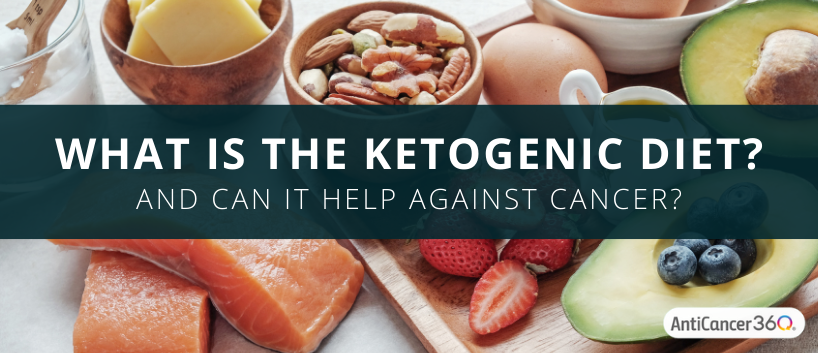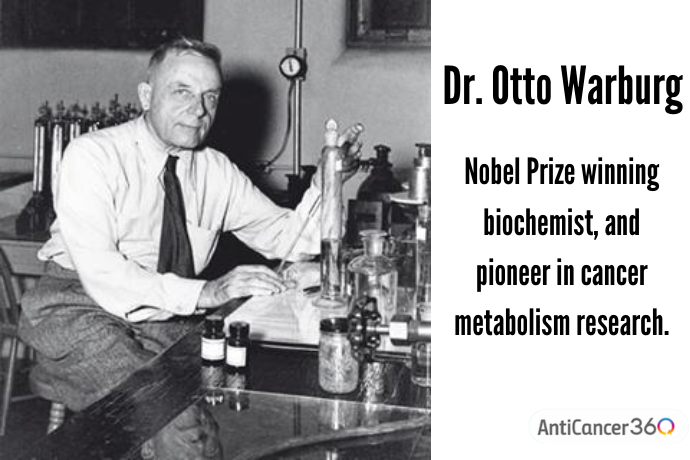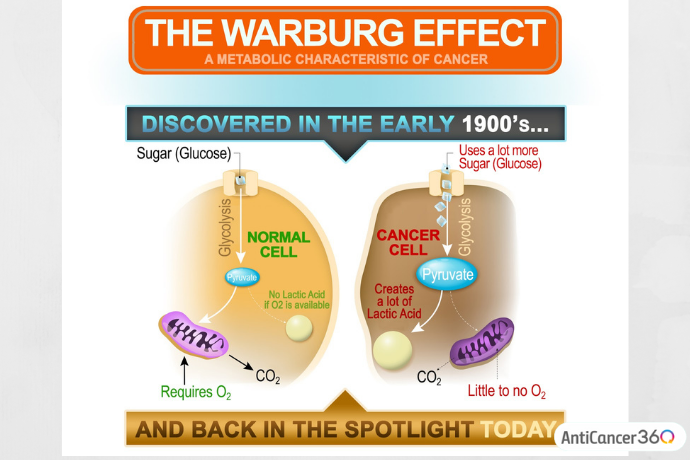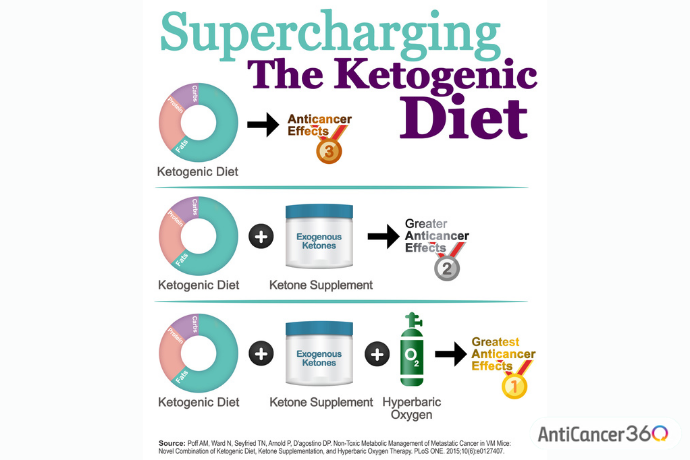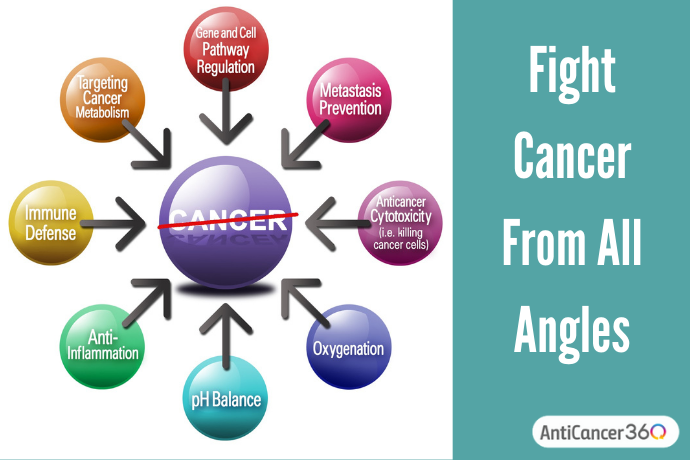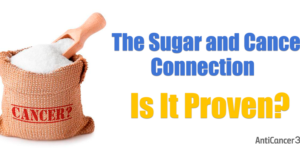Don’t have time to read? Here’s a quick summary:
- A ketogenic diet is high in fat, moderate in protein, and very low in carbohydrates.
- A diet like this causes your body to produce “ketones” to help fuel your cells in the absence of sufficient sugar.
- This diet targets cancer’s metabolic weakness… specifically, (most) cancer’s reliance on sugar for fuel.
- This metabolic weakness of cancer was discovered in the 1920’s. And for a long time, it was overshadowed by cancer genetics research.
- But the metabolic aspects of cancer are back in focus amongst cancer researchers.
- Ketogenic diets don’t really “starve the cancer” because there will always be some sugar in your blood. Rather, it allows you to avoid “overfeeding the cancer cells” since they are the well adapted to utilize sugar and insulin.
- The ketones themselves have a variety of potential anticancer effects… even if you’re not on a ketogenic diet. Researchers found this by testing “exogenous ketones” (i.e. a ketone supplement,) on mice that were fed a normal diet.
- Overall, preliminary research has shown that the ketogenic diet can help against cancer. However, these anticancer effects aren’t strong enough to call it a “cure” by any means.
- Most importantly… because of its non-toxic nature, and because of its potential to help against cancer… the use of a ketogenic diet is warranted if you desire (in addition to your oncologists treatment).
- Ketogenic diets may also be synergistic with other strategies for even greater anticancer effects.
- Overall, the ketogenic diet can be a beneficial part of an overall integrative approach in many cases.
If you’re looking into anticancer diets, there’s a good chance you’ve heard about the ketogenic diet… also known as the “keto diet.”
But for those of you who aren’t very familiar, I wanted to write a “beginners guide” type of article. This way you can get a more in depth understanding of this kind of diet.
Overall, the keto diet isn’t the only diet that may help against cancer. But with all of the science that supports its use, I do think it’s something that should be considered (depending on your situation).
So today we’re going to talk about the ketogenic diet in relation to cancer, and how it may be able to help your case.
Radically Different From A “Normal Diet”
Compared to a “normal diet…” ketogenic diets are radically different in terms of nutrient intake. Most diets are rich in carbohydrates, fairly high in protein, and relatively low in fat.
The ketogenic diet on the other hand is basically the opposite… It’s very high in fat, moderate in protein, and very low in carbohydrates.
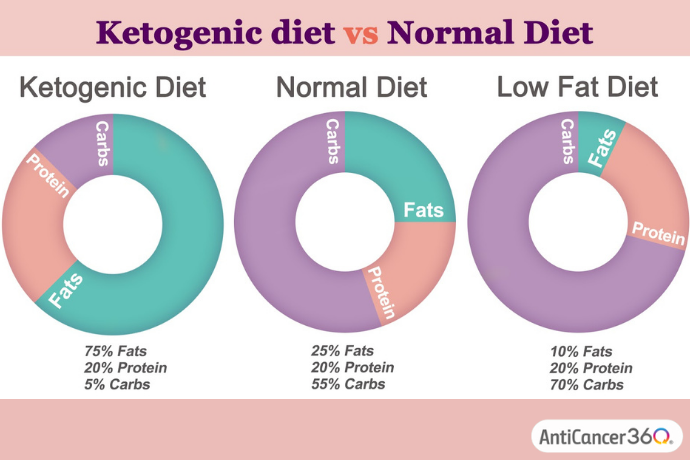
The reason it’s called a ketogenic diet is because your body produces “ketone bodies” to help fuel your cells with fats in the absence of sufficient sugar. This happens when your carbohydrate intake gets low enough, and these ketones can be measured in the urine or blood.
So instead of your body running on carbohydrates and sugar, you’re making it burn fats and ketones for fuel instead.
The Resurgence Of The Ketogenic Diet
Ketogenic diets were initially used in the 1920’s as a treatment against epilepsy. And though the ketogenic diet got overshadowed by anti seizure drugs, it has seen a resurgence for managing drug resistant epilepsy (especially in children.)
The keto diet has also seen a resurgence for things like weight loss, diabetes, and even Alzheimer’s disease.
But most importantly for today’s article, the ketogenic diet has also seen a resurgence for it’s ability to help fight cancer.
This renewed interest of the ketogenic diet for cancer is partly due to the resurgence of metabolic research related cancer.
Most cancer cells are very different from healthy cells in the way they make energy. Another way to say this is that their metabolism is “deranged.”
This unique characteristic of cancer was discovered in the 1920’s by a Nobel Prize winning biochemist named Otto Warburg. Because of this, cancer’s “deranged metabolism” is also referred to as the “Warburg Effect.”
But after Warburg’s era of research into cancer metabolism, it was basically overshadowed by developments in cancer genetics research. So instead of looking at how cancer cells made energy, scientists started to focus more on the genes that tell cells what to do.
So after the Warburg Era, the “genetic model of cancer” really took over in the science world.
Cancer Cell Metabolism, Sugar, And The Ketogenic Diet
But fast forward to 2021 (about 95 years since the Warburg Era,) and cancer cell metabolism is back in the spotlight in terms of cancer research.
In fact, even top cancer researchers have acknowledged the metabolic aspects of cancer as one of the new hallmarks of cancer [1],[2].
Overall, the metabolic problems that occur in cancer are often discussed side by side with the ketogenic diet because they both relate to sugar.
Cancer cells tend to burn sugar using a process that does NOT depend on oxygen (even when there’s oxygen available to them.) This process is called “aerobic glycolysis,” but it’s also known as the Warburg Effect, or aerobic fermentation.
But because of this dependence on aerobic glycolysis, cancer cells are also more reliant on sugar for fuel.
Healthy cells on the other hand can use sugar, fats, or proteins for fuel because they mostly use an oxygen dependant process called “respiration.” Most cancer cells can’t conduct respiration very well, so they’re less flexible in what they can use for fuel.
So because cancer cells rely mostly on sugar, and have a hard time using fats for fuel… the ketogenic diets exploits this by minimizing sugar, and by switching your body to fats as it’s main source of fuel.
To put it simply, the ketogenic diet target’s one of cancer’s main weaknesses… its reliance on sugar for fuel.
There’s More To The Story: Cancer Cells, Insulin, And Sugar Transport
But when you really look into cancer cell metabolism, it’s not quite as simple as “starving the cancer of sugar” by using a ketogenic diet. The reason is that you’ll always have a significant levels of sugar in your blood… even if you completely eliminate carbohydrates and sugar from your diet.
For most people, ketogenic diets still leave them with about 75 mg/dl of blood sugar. In some cases it can go into the 60’s (mg/dl). And in other cases it can remain fairly high in the 80’s or even higher (mg/dl).
And as you’ll see later, cancer cells have a lot of sugar transporters to help them pull this sugar into the cell.
So on a ketogenic diet, the cancer cells still have sugar to available to them… BUT what a ketogenic diet does is prevent you from OVER FEEDING the cancer cells.
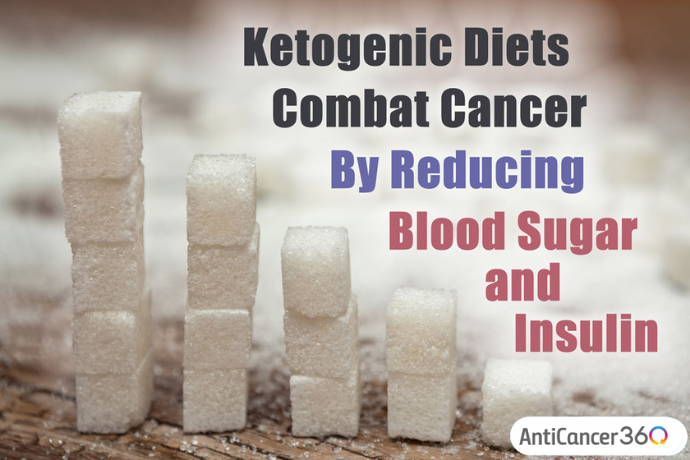
Ketogenic Diets Combat Cancer By Reducing Blood Sugar And Insulin
When you do a ketogenic diet, your blood sugar basically remains in the lowest part of the normal range (i.e. near 75 mg/dl.)
But on a normal high carbohydrate diet, your blood sugar usually skyrockets after a meal… up to about 140 mg/dl in healthy people.
When this happens, our body has to put out a lot of insulin into your bloodstream. This signals cells to take in the sugar, which subsequently lowers your blood sugar.
But cancer cells are also better equipped to benefit from this insulin spike…
Because many cancers have a greater metabolic reliance on sugar, they also develop mechanisms to take advantage of insulin spikes that occur after high carbohydrate meals.
So while all your cells can “feed” off of the increase in blood sugar and insulin from high carbohydrate meals… many cancer cells are especially well adapted to benefit from this.
So when you do a ketogenic diet, there still is sugar in your blood for the cancer to feed on… BUT, you don’t have the blood sugar and insulin spikes that would “overfeed” the cancer cells.
So rather than just restricting sugar, you can also think of the ketogenic diet as an “insulin inhibiting” diet. This is one of the most important aspects of ketogenic diet against cancer.
Even More To The Story: The Role Of Ketones Themselves
So besides minimizing sugar and insulin in the body, another benefit of the ketogenic diet are the ketones themselves.
To refresh your memory, your body produces “ketones bodies” to help feed your cells when you carbohydrate intake becomes very low. This can also happen with fasting, and during starvation.
But besides the ketones that your body makes, you can also get ketones in the form of ketone supplements (also known as “exogenous ketones.”)
So researchers at University of Southern Florida wanted to see if ketones themselves would have anticancer effects, even when there was plenty of carbohydrates in the diet. And based on an animal study they conducted… the answer was YES.
What they found was that ketones could increase survival time by roughly 50- 70% compared to mice that weren’t treated at all [11].
These researchers suspect ketones to have anticancer benefits for these potential reasons:
- Ketones can help to block cancer’s ability to use the sugar they had available (i.e. ketones can have an “antiglycolytic” effect) [12].
- Ketones can also decrease oxidative stress in microenvironment between the healthy cells and the tumor, make a less favorable environment for cancer cells.
- Ketones enter cells using the same transporters that allow cancer cells to pump out lactic acid. This can decrease cancer cell growth and survival.
- Ketones may activate anticancer genes, and suppress cancer promoting genes.
So when you really look into ketogenic diets and cancer cell metabolism, you’ll see that ketogenic diets help to fight cancer by limiting sugar, limiting insulin, and providing the body with ketones.
What The Research Says About Ketogenic Diets For Cancer
With this resurgence of interest in cancer cell metabolism, researchers have also done some preliminary studies into ketogenic diets in relation to cancer. And both animal and human studies have shown the potential for benefit.
One of the more notable studies was done by doctors and researchers at The Albert Einstein College of Medicine in New York [13]. Though the study was small (only 10 patients), it does give you some evidence to help make a decision on what type of diet you might want to utilize.
Overall, in these 10 patients, the cancer:
- continued to grow for 4 of them
- stabilized for 5 of them
- shrunk for 1 patient
Remember, all of these patients had advanced cancers which were not getting better from at least 2 types of conventional cancer treatments. So while these results don’t seem to be “stellar” at first glance, they seem pretty promising when you consider the circumstances.
So in this study, the people who didn’t respond to the diet were generally people who had the lowest levels of ketosis, and higher levels of insulin overall. On the other hand, the people with the highest levels of ketosis were generally the ones that had good results.
This is also why it’s important to get your ketones levels to fairly high levels, when you’re using a ketogenic diet against cancer.
Another notable study was done by doctors in Wuerzburg Germany [14]… Though their nutritional guidelines allowed much more carbohydrates than usual, 5 of the 11 patients who followed through with the diet were able to achieve disease stabilization.
The Role Of A Ketogenic Diet In Cancer Treatment
Overall, there’s only preliminary evidence that ketogenic diets are beneficial against cancer. And as you can see, it’s far from being a “cure for cancer.” Rather, I see it as one of many potentially beneficial strategies that you can use against cancer overall.
Ultimately when using an integrative approach to cancer (i.e. using natural therapies, while not foregoing conventional treatments) even lower levels of evidence can warrant the use of a certain approach. The only other criteria is that it doesn’t cause any bodily or financial harm.
And because ketogenic diet are safe when done correctly, this limited evidence is enough to warrant its use… or at least consideration.
Perhaps the most important thing is that the ketogenic diet can buy you time. This is important because it’s often difficult to know whether or not a certain treatment or approach will benefit your case (until you try it.) But time is usually the limiting factor….
So using a ketogenic diet can at least stabilize the disease in many cases. This way you have more time to combat the cancer using other approaches.
The ketogenic diet may also be synergistic with other anticancer approaches. An example of this is the potential synergy between ketogenic diets, hyperbaric oxygen therapy, and exogenous ketone supplements [15],[16]. Adding these other approaches was able to significantly increase survival time in animal models.
And with our Aggressive Integrative Approach, there are so many techniques that we can use in combination that there’s a good possibility of additional synergistic effects also.
Overall, it’s important to remember this because in an Integrative Approach, we never just target the cancer with a single approach. Rather we use a systems approach to help support your body, and allow it to target the cancer from as many angles as possible (in addition to your oncologist’s treatments.)
And much like the previous studies showed, there may be even greater “synergies” between these approaches that haven’t yet been defined by researchers.
Conclusion
There are many different approaches and techniques that you can use to help your body fight cancer. And if there is at least some evidence of benefit, and it won’t cause you any harm … then it’s something that should be considered.
Ultimately, with all of the emerging science surrounding cancer cell metabolism, the ketogenic diet is definitely one of these options that you should consider for your case.
Are You A Good Candidate For Our Program?
If you’d like to learn more about the AntiCancer360 approach and see if we can help you… either click here to schedule a free call so we can discuss your case in more detail, or watch our free online webinar to learn more about our approach.
Citations:
Gene Wei is a Board Certified Doctor of Oriental Medicine in the state of Florida, and the founder of AntiCancer360. He’s also a graduate of the University of California Los Angeles, and East West College of Natural Medicine.
His practice is focused on integrative and natural anticancer strategies. Over the years, he’s helped many people overcome difficult cancers… including some cases of “terminal cancer” which were able to be reversed with an “Aggressive Integrative Approach.”

